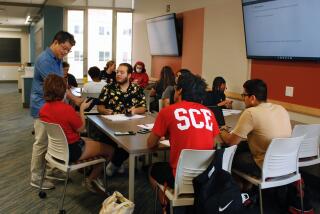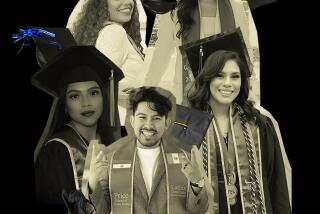Grandmother in the Dorm--She’s Leading Two Lives
Ann Miller is pretty much the typical college girl--casual in pants and sweater, full of talk about the new semester’s classes, glad to see friends after the winter break, eager to delve into the new books on her dorm room shelf.
She is typical, that is, until you notice the photos of her grandchildren.
A Total Experience
That Ann Miller should be a senior at Scripps College at the age of 68 is not very unusual in these days of emphasis on lifelong education. That she would choose to live in a campus dorm is.
“I wanted the total (college) experience,” said Miller, who leaves her spacious Pasadena home for her dorm digs (“my cell in the nunnery”) during the week. “Living in the dorm has given me a certain freedom from responsibility. I haven’t had that very much in my life.
“I enjoy living closely with young people. I have equality with them. It’s different from the way it was with my own children.”
Miller’s life has been fairly typical of a woman of her generation: wife and homemaker, mother (two children from her first marriage, two of her second husband’s, one from their union), community work (Hadassah, the Pasadena Mental Health Auxiliary, her synagogue), a standing Friday afternoon bridge game.
But she always managed to pursue the education denied her by financial need in the Depression and early marriage and motherhood. She took extension courses at UCLA and the University of Judaism--and she was an omnivorous reader.
Right now reading is one of her problems.
“I have so much reading to do for classes,” she said, “that I haven’t read a newspaper in three months.”
The sign on Room 127 of Browning Hall on the Scripps College campus in Claremont offers “Psychiatric care 5, by appointment only” and gives the occupant’s name: Ann Miller.
Today Miller, a slender woman, is wearing pants in a muted stripe, boots, a bright scarf at the neck and a white sweat shirt daintily inscribed “Scripps College” on the left shoulder.
She opens the door to a simply furnished room--single bed, desk and table, chest of drawers, a small refrigerator, two chairs. Miller has hung several colorful scarfs to brighten the scene, along with a poster of the Israel Philharmonic Orchestra--and the profusion of photos of her five children and eight grandchildren.
She offers guests the chairs, perches on the edge of the bed and speaks with enthusiasm of her spring semester classes: international relations, modern art and Modernism, immigration and ethnicity in the United States, American film studies (“See a great movie once a week, go to class and write a paper”).
Miller was looking forward to a weekend seminar on democracy in America--and, of course, her Friday afternoon bridge game with friends from the Pasadena Mental Health Auxiliary.
She had some mixed emotions, however.
“I get elated the minute I come back to school,” she said. Then a few minutes later, upon serious consideration: “The prospect of this semester is overwhelming.”
Miller, who will be graduated in December, is an English major, “British and American literature, mainly 19th-Century British and contemporary American. It is most pleasurable. I have read all my life, and I figured college would be reading English novels. . . . I also have taken history, philosophy, the humanities.”
A native of Montreal, Miller had a bilingual education in English and French from third grade through high school. To brush up her French (“I hadn’t had French in five-oh years”) she chose to live in Browning Hall’s “French corridor,” an area of 10 students and an adviser who strive to improve their conversational skills in the foreign language.
She chose Scripps because it is a small women’s college, she said, with a good Continuing Education program in which she could feel comfortable. She went with the blessing of her husband of 25 years, Charles, a physicist at JPL and Caltech.
“I wanted to make the best of what I had left,” she said. “Then, five months after I had started school, my husband died. It was terribly traumatic, a sudden heart attack. . . . College was a place to lose myself. It made the grief tolerable.
“Going to college got me off the backs of my children and let me go my own way.”
Miller said her grade average is “a bland B”--yet she received warm congratulations and a handshake when a 20-ish classmate found out Miller got a strong B+ on her senior thesis, which she completed two semesters ahead of time.
She is uncertain about what she will do after graduation, except that she “absolutely will not” attend graduate school: “That is very hard work.”
“I don’t make plans; I’m rolling with the punches, adapting,” she said. “Several professors have tried to interest me in doing research projects with them. As for a job, I would have to find employment irresistible. I really don’t think I’d go to work.
“I’d like to travel, spend six months in Europe, which I’ve never had time to do. Right now I am looking at possible study abroad in the fall. That would be a peak experience, the final fillip to my college days. I’d like to go to Geneva where I could use my French and still keep my English. I am not sure. It is a gleam in my eye at this moment.
“After graduation I am sure I will have a lot of options. We always have more than we can use.”
Ann Miller opened the door of her spacious, traditionally furnished home, this time dressed in a stylish cowl-necked sweater, trim skirt and high heels, every bit the proper Pasadena matron. She hospitably offered refreshments, then spoke of her family, her background--and going to college at the age of 68.
She has five children ranging in age from 46 to 24, she said. Four live in California, with one married daughter and two grandchildren in Paris. Her eldest and youngest are sons and attorneys; two daughters live in Southern California. All heartily endorse their mother’s going to college.
“My family is delighted,” Miller said. “It’s a feather in their caps to have a mother doing something different, one who is ready to stand on her own two feet.
“At college, everybody else gets their parents to visit, and I don’t.” She laughed lightly. “Oh yes, my son comes out and takes me to dinner and sends care packages, and my grandsons helped pack me up and move.
“And the young people at school envy me--I am free to come to a home without parents.”
Back at Scripps, Miller strolled the spacious campus, showing points of interest to visitors. In Denison Library she greeted an attractive young woman--perhaps the age of one of her daughters--and identified her as “my English professor.”
Ann Miller finds few drawbacks to living on campus, the chief one being rigid meal hours. She said her classmates are friendly and accepting despite the disparity in their ages--at least up to a certain point.
“I am the senior stateswoman,” Miller said, “but the age thing quickly dissolves. We are feeling the same way, the same anxieties and stresses.
“I think some of the students are lonesome; I find sort of a lack of socializing. But I think that for them the academic work is easier. I find the academics difficult. There is no time for peripheral reading.”
Later, at lunch, a fellow student asked Miller to hand in a slip to drop a class (“I think she couldn’t face the professor”). Then Miller glanced at the students lunching at nearby tables.
“We could have sat with them,” she said, “but sometimes I feel I inhibit their conversation. They accept me as one of them, but I think there’s a lot more boyfriend talk when I’m not at the table.
“They are so exuberant, so excited about everything. One of the good things about growing older is that you’re not devastated anymore. You learn that if things don’t work out one way, they will another.”
For Miller--who worked for free for a Canadian radio station during the Depression before moving into a salary of $2 a week, who loves theater and dancing, whose philosophy is “You have to dare to do something one step harder than you think you can do”--things will work out fine if she follows the advice of her eldest grandson.
“He is a sophomore at UC Santa Barbara,” she said. “He sends me encouraging notes: ‘Keep your grades up, Granny!’ ”






